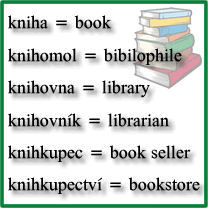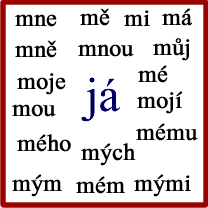
In my Czech lessons this week I learnt two words that can mean face – obličej [ˈoblɪt͡ʃɛj] and tvář [tvaːr̝̊], which also means cheek. I couldn’t work out why one was used to mean face in some contexts, and the other in other contexts. Can any of you enlighten me?
Obličej comes from the Proto-Slavic ob + lice (face, cheek), which is also the root of the Czech líc (front, face, right side, face side) and líce (cheeks).
Cognates in other Slavic languages include: Polish oblicze (face, character), Russian обличье (image, character, look), and Ukrainian обли́ччя (face, character) [source].
Tvář comes from the Proto-Slavic *tvarь (creation, creature) [source]. Cognates in other Slavic languages include: Polish twarz (face), Russian тварь (creature, being, animal, beast, monster; mean, vile, worthless), and Croatian tvar (substance, material) [source].
Another Czech word for face is ksicht, from the German Gesicht (face).






